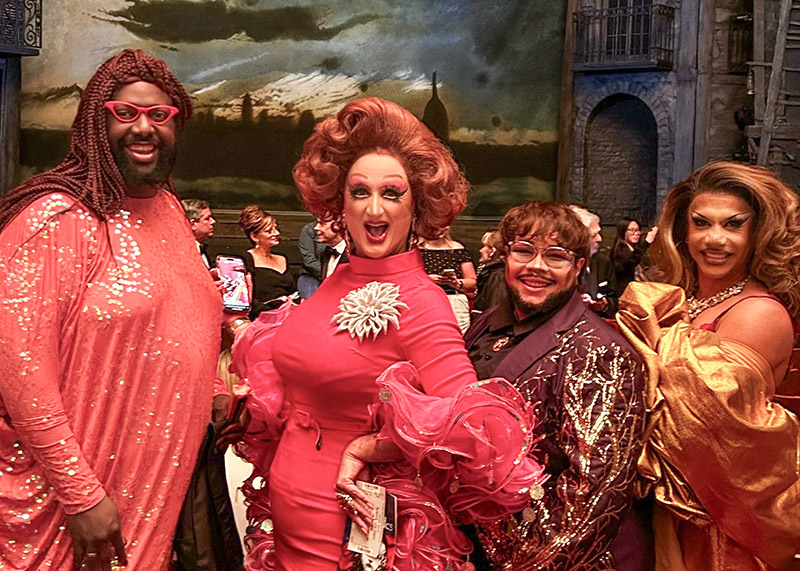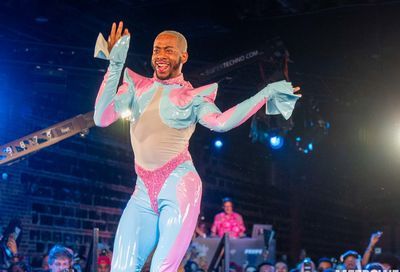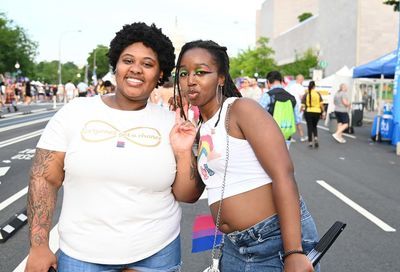Family Guy has started to ‘phase out’ gay jokes because they’re “not acceptable”
The long-running animated comedy has featured LGBTQ jokes and storylines throughout its 20-year run

Long-running animated sitcom Family Guy has started to ‘phase out’ gay jokes, producers have said.
Executive producers Rich Appel and Alec Sulkin said to TV Line that as the show evolves, “Some of the things we felt comfortable saying and joking about…we now understand is not acceptable.”
It came after the Sunday, Jan. 13 episode “Trump Guy,” which saw Peter Griffin accept the role of Donald Trump’s new press secretary — the second in a two-part storyline after the previous week’s episode saw the Griffin family patriarch become a purveyor of fake news.
During “Trump Guy” — which featured a five-minute-long battle between Peter and Trump after their personalities clashed — Trump says to Peter: “You’re Peter Griffin from Family Guy. Many children have learned their favourite Jewish, black and gay jokes by watching your show over the years.”
“In fairness, we’ve been trying to phase out the gay stuff,” Peter responds.
TV Line asked Appel and Sulkin if the line was more than just another of the show’s fourth-wall breaking gags, and they were serious about phasing out gay jokes.
“Kind of, yes,” Sulkin responded. “If you look at a show from 2005 or 2006 and put it side by side with a show from 2018 or 2019, they’re going to have a few differences. Some of the things we felt comfortable saying and joking about back then, we now understand is not acceptable.”
Appel added that Family Guy, much like The Simpsons, is relatively unique in that its long runtime — the show first started airing in 1999, though it was canceled twice during its first four seasons — has meant it has had to adapt and evolve to changing tastes.
“If a show has literally been on the air for 20 years, the culture changes. And it’s not us reacting and thinking, ‘They won’t let us [say certain things],'” Appel said. “No, we’ve changed too. The climate is different, the culture is different and our views are different. They’ve been shaped by the reality around us, so I think the show has to shift and evolve in a lot of different ways.”

Family Guy has been something of an equal opportunities offender since its inception, poking fun at everyone and everything, including LGBTQ issues.
Lately that trend has been towards some more thoughtful portrayals, particularly with regards Stewie, the Griffin’s infant, matricidal, hyper-intelligent son.
Last year, in the episode “Send in Stewie, Please,” Stewie talks out his sexuality — and his own confusion surrounding it — with a therapist voiced by gay acting legend Sir Ian McKellen.
After pushing another baby down some stairs, Stewie asserts it was because he was afraid the boy wouldn’t like him back.
“And not ‘like him’ like him. I’m not gay,” he says. “This whole thing isn’t because I’m gay, so calm down. I can already see you licking your chops. I’m sure you live for the coming out sessions. If anything, I’m less gay than I used to be. Not that anybody at this school would care.”
Despite asserting that he is “confident in my heterosexuality,” he also believes he and The Flash actor Grant Gustin would make “the most adorable Instagram couple.”
It was the latest in a number of episodes that have portrayed the one-year-old’s sexuality and gender identity as fluid — in fifth season episode “Boys Do Cry,” asked how he feels dressed as a girl, Stewie responds: “Umm, I feel right, Brian. I feel right.”

But Family Guy and creator Seth MacFarlane have also come under criticism for their approach to LGBTQ issues, including 2010’s eighth season episode “Quagmire’s Dad,” which saw Quagmire’s navy hero father come out as transgender, undergo gender confirmation surgery, and start living as Ida.
The episode, which featured Brian Griffin vomit for thirty seconds after finding out the “classy, smart, beautiful lady” he had sex with is Ida, led to GLAAD issuing a statement saying it “shares the serious concerns being voiced from members of the community.”
But MacFarlane hit back against the controversy, particularly with specific scenes and comments being taken out of context of the entire episode, which dealt with Quagmire and Ida coming to terms with their new dynamic.
In an interview with Metro Weekly in 2015, MacFarlane responded to the reaction to the episode:
Look back at All in the Family — there was a show that tackled all kinds of issues, and Archie Bunker was at the center saying some really God-awful things. But we all laughed because we knew how it was being presented and we knew whose side the creator was on, we knew where the writers were coming from. We knew they were coming from the right place.
In this soundbite culture we’re in now, it’s very different, and I feel if that show aired now, people would be grousing over things that Archie said independent of the context — and that’s where the critical thought aspect of it to me is not as present as it should be.
It was a little aggravating reading those responses to the “Quagmire’s Dad” episode. And I thought, “The whole point of the story was that Quagmire was having trouble with his father having a sex change, but at the end of the day he had to acknowledge, ‘Look, this is the same person. This is just the way they’ve chosen to live their life.’” He’s still a Naval hero and he’s still someone to be respected — or she, in this case.
All [critics] could lock onto was the fact that Brian threw up because he had had sex with Ida. Well, it’s a comedy, you know? I remember when I was a teenager thinking, “God, gay guys must be just as grossed out by vaginas as we are by penises.” And that, in the simplest terms, is where Brian was coming from. It was a very simplistic point of view, but it’s a joke. And if you look at the larger context of the episode, Jesus Christ, we’re all on the same side here. So that’s what to me was distressing.
But I think there’s a much larger problem with how people process issue-related comedy and not so much a problem with specifically how GLAAD and organizations in that corner processed this particular episode of TV. We live in a society where there’s often more outrage in the press over jokes than there is about actual racial or homophobic episodes. (Read the full interview here.)
Support Metro Weekly’s Journalism
These are challenging times for news organizations. And yet it’s crucial we stay active and provide vital resources and information to both our local readers and the world. So won’t you please take a moment and consider supporting Metro Weekly with a membership? For as little as $5 a month, you can help ensure Metro Weekly magazine and MetroWeekly.com remain free, viable resources as we provide the best, most diverse, culturally-resonant LGBTQ coverage in both the D.C. region and around the world. Memberships come with exclusive perks and discounts, your own personal digital delivery of each week’s magazine (and an archive), access to our Member's Lounge when it launches this fall, and exclusive members-only items like Metro Weekly Membership Mugs and Tote Bags! Check out all our membership levels here and please join us today!





























You must be logged in to post a comment.